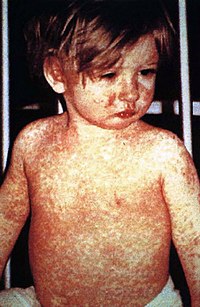
Photo from wikipedia
Abstract Background Mycobacterium haemophilum is a nontuberculous mycobacterium with fastidious in vitro growth requirements and an increasingly reported cause of extrapulmonary disease. Timely diagnosis and management of M. haemophilum infections… Click to show full abstract
Abstract Background Mycobacterium haemophilum is a nontuberculous mycobacterium with fastidious in vitro growth requirements and an increasingly reported cause of extrapulmonary disease. Timely diagnosis and management of M. haemophilum infections and the immune reconstitution inflammatory syndromes (IRIS) observed in a subset of patients during treatment remain challenging. Methods We conducted a retrospective chart review between January 1, 2010, and January 1, 2022 and identified 26 patients diagnosed with M. haemophilum infection at our institution. We describe their clinical presentation, diagnostic results, management, and outcomes. Results The majority of patients in our cohort had upper and/or lower extremity skin involvement, were immunosuppressed, and had generally favourable treatment outcomes. All tested M. haemophilum isolates were susceptible in vitro to clarithromycin and trimethoprim-sulfamethoxazole. Moreover, high rates of susceptibility were noted for ciprofloxacin (95%), linezolid (90%), and rifampin (85%). IRIS was identified in 31% of cases and should be considered in patients who develop worsening skin lesions or systemic symptoms following the initiation of effective antimicrobial therapy. Visualisation of acid-fast bacilli on initial tissue stains, a positive mycobacterial blood culture, and rapid de-escalation of tumour necrosis factor-α inhibitors and/or corticosteroids were more frequently encountered among patients in our cohort who developed IRIS. Conclusion M. haemophilum infection should be considered among patients receiving immunomodulatory therapy who develop discoloured or nodular skin lesions involving the extremities, worsening focal arthritis, tenosynovitis, or isolated adenopathy. A heightened awareness of this pathogen’s clinical and laboratory characteristics can lead to a timely diagnosis and favourable outcome.
Journal Title: Infectious diseases
Year Published: 2023
Link to full text (if available)
Share on Social Media: Sign Up to like & get
recommendations!